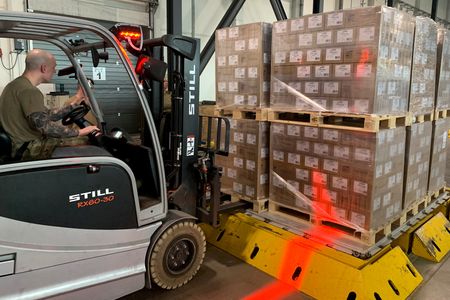 1
1 1
1

By Ahmed Aboulenein
WASHINGTON (Reuters) – A military cargo plane carrying the first shipment of infant formula from Europe to address a critical shortage in the United States landed in Indianapolis on Sunday.
A Feb. 17 recall by top baby formula maker Abbott Laboratories and the closing of its manufacturing plant in Sturgis, Michigan has created one of the biggest infant formula shortages in recent history for U.S. families.
President Joe Biden’s administration is seeking to stock empty shelves with 1.5 million containers of Nestle specialty infant formulas. Biden last week invoked the Cold War-era Defense Production Act to help increase supplies.
The Sunday plane is carrying 78,000 pounds (35,380 kg) of specialty infant formula, the White House said.
“There’s about enough formula on that plane, specialty medical grade formula, for about a half a million bottles. That’s about 15% of the overall national volume this coming week,” White House National Economic Council Director Brian Deese told Fox News Sunday.
Agriculture Secretary Tom Vilsack was there to greet the plane.
Abbott, the biggest U.S. supplier of powder infant formula, closed its Michigan plant following reports of bacterial infections in four infants, worsening a shortage among multiple manufacturers that began with pandemic supply-chain issues.
Abbott Chief Executive Robert Ford apologized for the formula shortage on Sunday and promised to fix it, adding that the plant would be reopened in the first week of June, and it would take six-to-eight weeks for products to reach store shelves.
“We’re sorry to every family we’ve let down since our voluntary recall exacerbated our nation’s baby formula shortage,” Ford wrote in an opinion column published in the Washington Post.
Ford said the U.S. Food and Drug Administration investigation did not find links between the formula production area of Michigan facility and four cases of sick children but that it did find evidence of bacteria present.
(Reporting by Ahmed Aboulenein, additional reporting by Chris Gallagher, editing by Ross Colvin and Bill Berkrot)